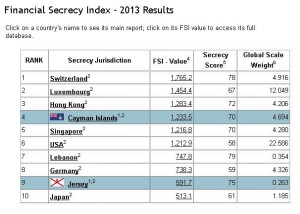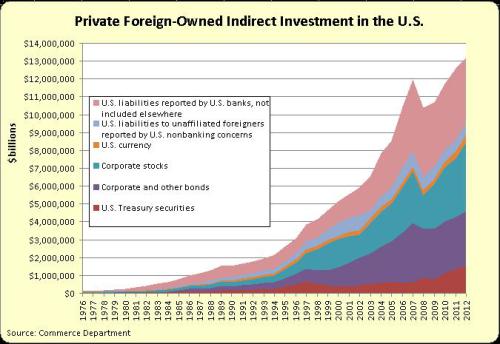To put it mildly, I’m not a fan of the so-called Tax Justice Network. In a moment of typical understatement, I referred to the U.K.-based group as “…a bunch of crazy Euro-socialists.” And to give you an idea of why I don’t like them, here’s some of what I wrote about them two years ago.
…the Tax Justice Network [is] closely allied with governments in left-wing nations such as France, and they share the same goals as statist international bureaucracies such as the Paris-based Organization for Economic Cooperation and Development. If they succeed in crippling tax competition and setting up some sort of global network of tax police, more politicians will raise tax rates, causing more misery, and bringing more nations one step closer to Greek-style fiscal collapse.
With this bit of background, it goes without saying that I very rarely agree with TJN. But just as a stopped clock is right twice daily, the Tax Justice Network on rare occasions will produce some worthwhile research. For example, here are some passages from my article in the latest issue of the Cayman Financial Review (where I’m a member of the Editorial Board).
…would anybody, if asked to list the world’s 10 biggest tax havens, put together a list that includes Germany, Japan and the United States? Sounds absurd, but that’s precisely what the ideologues at the Tax Justice Network (TJN) asserted in the Financial Secrecy Index (FSI) released last November. …To be fair, though, the methodological approach used in the FSI report is not wholly objectionable. The TJN is seeking to come up with a measure that combines both the degree to which a jurisdiction has “secrecy” laws and the extent to which that jurisdiction attracts global capital. In other words, the TJN’s philosophical leanings are extreme and the organization obviously is motivated by a desire to hinder tax competition and fiscal sovereignty, but the FSI report provides an interesting way of seeing which so-called tax havens play the biggest role in the world economy.
And one of the biggest tax havens – number 6 according to TJN – is the United States.
I have no objection to their choice.
It makes sense to include the United States because there are several attractive policies for global investors, including the non-taxation and non-reporting of certain types of capital income. Moreover, several states have very friendly incorporation laws.
When I’m talking about “friendly incorporation laws,” I’m referring to the fact that states such as Delaware, Nevada, Wyoming, and others make it easy for everyone – particularly foreigners – to set up companies. This is a good thing for business and investment, but it irks statists because many American states don’t require the collection and sharing of information that foreign governments want for purposes of enforcing bad tax law.
So the United States is a de facto tax haven.
But that’s just part of the story. When I discuss the “non-taxation and non-reporting of certain types of capital income,” I’m referring to the fact that the internal revenue code generally does not impose tax on interest and capital gains paid to foreigners (specifically nonresident aliens). And because we don’t tax those payments, there’s no requirement to report that information to any government. As you can imagine, this irks the left because it means there’s no information to share with foreign governments that want to track – and tax – flight capital.
To reiterate, this makes the United States is a de facto tax haven.
These laws are extremely beneficial to the American economy. To get an idea of why the United States is a big winner from being a “tax haven,” look at this chart showing historical data on the amount of money foreigners have invested in stocks, bonds, and other forms of indirect (sometimes called passive) investment in America.
By any standard, $13 trillion is a lot of money. Those funds boost our financial markets, enable job creation, and increase economic performance. We don’t know how much of that money is invested in the United States because we have a friendly and confidential tax system for nonresident aliens, but it surelyhelps to explain why there’s so much foreign investment in America.

Let’s be thankful that the United States is a so-called tax haven. Those pro-growth policies help to offset Obama’s bad policies. Indeed, two Canadian economists found that tax havens actually are economically beneficial for high-tax nations.
But that’s not the moral of the story. Yes, I like that America is a tax haven for foreigners, but the real moral of the story is that we should apply the same good policies to Americans.
Let’s get rid of the corrupt internal revenue code and adopt a simple and fair flat tax. That means a low tax rate, of course, but it also means no double taxation of income that is saved and invested.
Which means Americans would get the same pro-growth treatment now reserved for foreigners.
For more information, here’s my video on the economic argument for tax havens.
